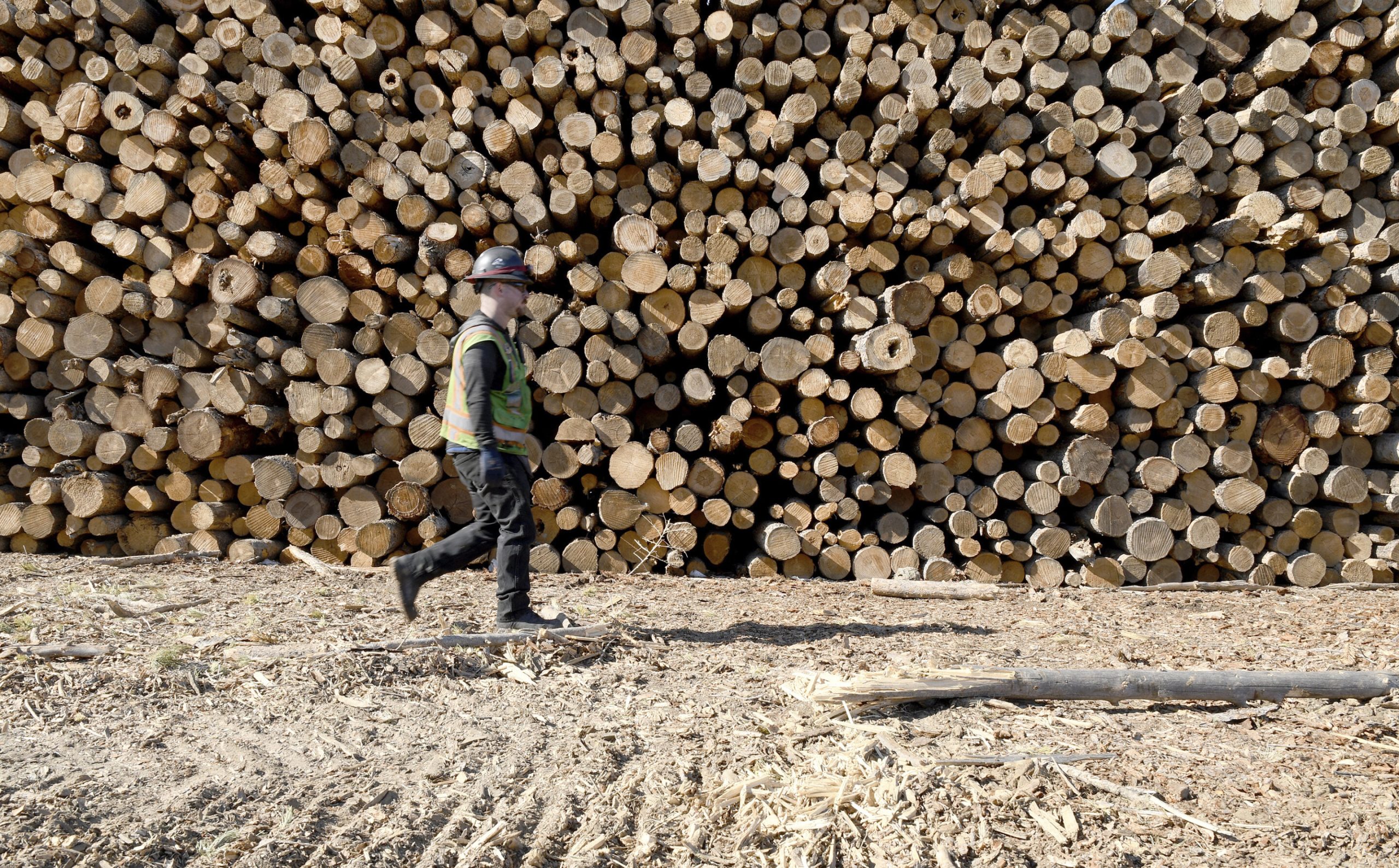Equipment operator Matt Odiaga walks in front of a pile of waste wood at the Biochar Now facility in Berthoud, Colo., on Monday, Feb. 13, 2023. Colorado lawmakers want to commission a study to see if biochar, a carbon-rich substance that resembles charcoal, can be used to plug the hundreds of deserted oil and gas wells across the state. The material could also be used to filter and absorb pollutants that leak from the wells. Credit: AP Photo/Thomas Peipert
From Colorado’s high desert to the wooded hills of Pennsylvania, millions of oil and gas wells sit deserted, plunging thousands of feet into the earth. Many haven’t been plugged, some leak greenhouse gases.
In Colorado, lawmakers are considering a solution that would give these wells a new, redemptive purpose: deep receptacles to trap carbon for millennia.
The idea is to keep carbon locked away in a special type of charcoal known as biochar, which is made by burning organic matter at high heat and low oxygen. The substance could be used to fill defunct oil and gas wells. Proponents say biochar would not only filter dangerous gas leaks but also stop that carbon from forming carbon dioxide, a greenhouse gas.
Colorado lawmakers gave initial approval Thursday for a study to assess whether biochar would work to plug defunct wells.
If successful, experts say that sinking biochar into a portion of the over 3 million abandoned oil wells nationwide could help tackle climate change—estimates range from keeping millions to billions of tons of carbon dioxide out of the atmosphere.
Still, the idea is relatively new and a number of feasibility questions remain. The study would direct Colorado State University to review research and run new tests to determine, in part, the efficacy of biochar in filtering gases and sequestering carbon as well as the technical feasibility of using it to plug oil and gas wells.
Site manager Ben Odiaga holds a sample of processed carbon at the Biochar Now facility in Berthoud, Colo., on Monday, Feb. 13, 2023. Colorado lawmakers want to commission a study to see if biochar, a carbon-rich substance that resembles charcoal, can be used to plug the hundreds of deserted oil and gas wells across the state. The material could also be used to filter and absorb pollutants that leak from the wells. Credit: AP Photo/Thomas Peipert
Carbon naturally cycles through Earth’s ecosystems, floating in the atmosphere as carbon dioxide before being snatched up by little bluestem grasses, ingested by grazing bison on the prairie, and when the animal keels over and begins decomposing, returning to the atmosphere as carbon dioxide.
But extracting fossil fuels has unearthed carbon—formed out of ancient plant matter over eons—that’s been stored underground largely since the Mesozoic Era, the age of dinosaurs over 65 million years ago.
“Where we need to focus is: How do we not only stop putting excess carbon into the cycle but can we take measures to take carbon out of the cycle permanently?” said Rep. Karen McCormick, a Democrat and one of the bill’s sponsors. “That’s where I see biochar having a great benefit.”
North of Denver in the small town of Berthoud, one company already makes biochar. On a recent day at Biochar Now’s facility, a tractor drove across the muddy yard, its bucket holding shards of wood bound for a new life as biochar.
Waste wood is organized in piles at the Biochar Now facility in Berthoud, Colo., on Monday, Feb. 13, 2023. Colorado lawmakers want to commission a study to see if biochar, a carbon-rich substance that resembles charcoal, can be used to plug the hundreds of deserted oil and gas wells across the state. The material could also be used to filter and absorb pollutants that leak from the wells. Credit: AP Photo/Thomas Peipert
Nearby, dead logs were stacked in neat piles. They were likely either killed by invasive beetles in Rocky Mountain forests or were casualties of a 2021 wildfire near Boulder, the most destructive in state history.
What they have in common, said James Gaspard, the company’s co-founder, is that they’d otherwise be doomed to rot or burn, releasing carbon dioxide. Instead, the wood debris is loaded into large kilns, where the heat burns at three times the temperature of fire and the oxygen is sucked from the chamber in a process called pyrolysis. What’s left is biochar.
The substance has a carbon structure closer to a diamond, said Jim Ippolito, a professor at Colorado State University. While diamonds might last forever, biochar isn’t far behind and can keep the carbon inert—unable to form carbon dioxide—for centuries if not millennia. Unlike a decomposing bison, biochar pulls carbon out of the earth’s carbon cycle.
Workers sift through a bin of charred waste wood at the Biochar Now facility in Berthoud, Colo., on Monday, Feb. 13, 2023. Colorado lawmakers want to commission a study to see if biochar, a carbon-rich substance that resembles charcoal, can be used to plug the hundreds of deserted oil and gas wells across the state. The material could also be used to filter and absorb pollutants that leak from the wells. Credit: AP Photo/Thomas Peipert
Biochar is lightweight—like popcorn—and porous like a sponge, which is why it already has an international market. From Colorado, Biochar Now ships bags of the substance internationally for deployment as a filter at wastewater treatment plants, in soil to retain nutrients and in streams to pull out pollutants.
That’s partly why it’s being proposed to plug oil and gas wells. It could help absorb dangerous gases such as methane that seep from abandoned shafts. The plugging process includes pouring concrete at certain points in the well and can include stuffing the remaining space with a combination of fillers like sand, gravel or clay.
The Colorado study will determine if biochar could make up a portion of the slurry pumped into wells, and if it could be used as an ingredient in the concrete that’s poured as the plug.
- Site manager Ben Odiaga works at the Biochar Now facility in Berthoud, Colo., on Monday, Feb. 13, 2023. Colorado lawmakers want to commission a study to see if biochar, a carbon-rich substance that resembles charcoal, can be used to plug the hundreds of deserted oil and gas wells across the state. The material could also be used to filter and absorb pollutants that leak from the wells. Credit: AP Photo/Thomas Peipert
- Kiln operator Tanner White works at the Biochar Now facility in Berthoud, Colo., on Monday, Feb. 13, 2023. Colorado lawmakers want to commission a study to see if biochar, a carbon-rich substance that resembles charcoal, can be used to plug the hundreds of deserted oil and gas wells across the state. The material could also be used to filter and absorb pollutants that leak from the wells. Credit: AP Photo/Thomas Peipert
- Site manager Ben Odiaga walks past a waste wood sorter at the Biochar Now facility in Berthoud, Colo., on Monday, Feb. 13, 2023. Colorado lawmakers want to commission a study to see if biochar, a carbon-rich substance that resembles charcoal, can be used to plug the hundreds of deserted oil and gas wells across the state. The material could also be used to filter and absorb pollutants that leak from the wells. Credit: AP Photo/Thomas Peipert
- Colorado State Rep. Karen McCormick sits for an interview at the Capitol building in Denver on Tuesday, Feb. 14, 2023. Colorado lawmakers want to commission a study to see if biochar, a carbon-rich substance that resembles charcoal, can be used to plug the hundreds of deserted oil and gas wells across the state. The material could also be used to filter and absorb pollutants that leak from the wells. Credit: AP Photo/Thomas Peipert
- Kiln operator Chris Tullos works at the Biochar Now facility in Berthoud, Colo., on Monday, Feb. 13, 2023. Colorado lawmakers want to commission a study to see if biochar, a carbon-rich substance that resembles charcoal, can be used to plug the hundreds of deserted oil and gas wells across the state. The material could also be used to filter and absorb pollutants that leak from the wells. Credit: AP Photo/Thomas Peipert
- Workers use a high-pressure air gun to spray carbon dust off each other at the Biochar Now facility in Berthoud, Colo., on Monday, Feb. 13, 2023. Colorado lawmakers want to commission a study to see if biochar, a carbon-rich substance that resembles charcoal, can be used to plug the hundreds of deserted oil and gas wells across the state. The material could also be used to filter and absorb pollutants that leak from the wells. Credit: AP Photo/Thomas Peipert
Colorado’s oil and gas industry association said it “looks forward” to working with McCormick in finding the best use for biochar.
If passed, the measure would let scientists take a key step forward in assessing whether biochar in wells is a viable form of carbon sequestration.
“That’s what we need to prove, back this up with hard data, so that we can say, ‘Hey Louisiana, hey Mississippi, hey Texas, you can see what we are doing here,'” McCormick said.
© 2023 The Associated Press. All rights reserved. This material may not be published, broadcast, rewritten or redistributed without permission.
Citation: Colorado ponders storing carbon in defunct oil and gas wells (2023, February 16) retrieved 22 February 2023 from https://phys.org/news/2023-02-colorado-ponders-carbon-storage-defunct.html
This document is subject to copyright. Apart from any fair dealing for the purpose of private study or research, no part may be reproduced without the written permission. The content is provided for information purposes only.
































